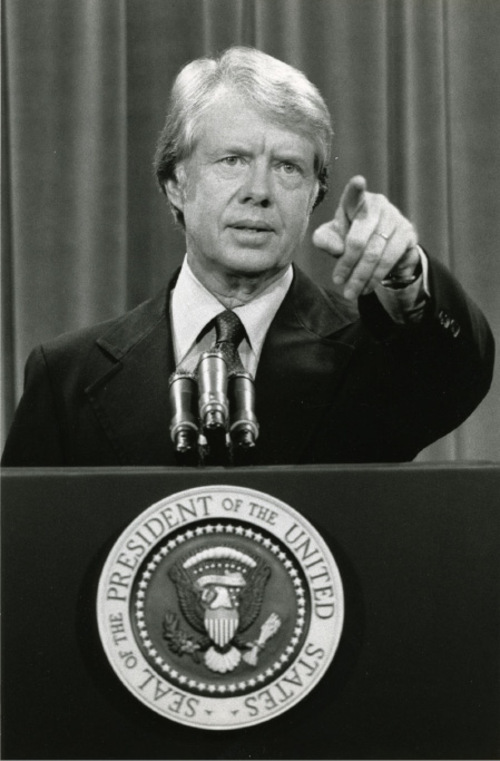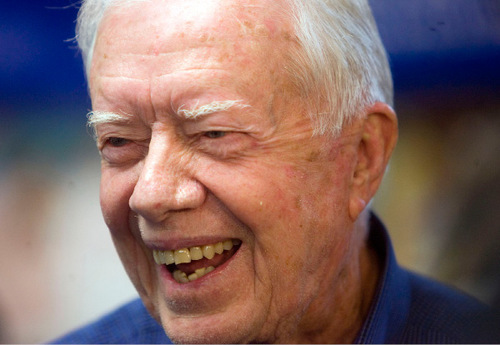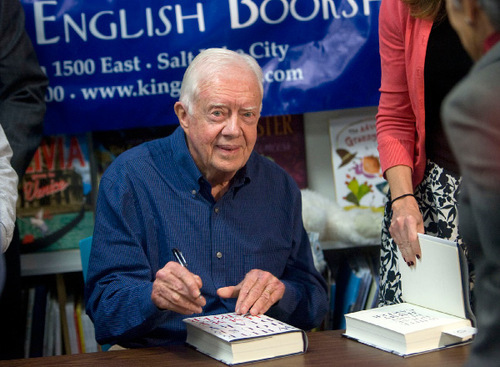This is an archived article that was published on sltrib.com in 2010, and information in the article may be outdated. It is provided only for personal research purposes and may not be reprinted.
For a man who evangelized foreign leaders and taught Sunday school while U.S. president, Jimmy Carter has some strong words for what he sees as an "excessive melding of religion and politics."
And it began, he said, with the denomination he called home for more than seven decades: the Southern Baptist Convention.
"It's now metastasized to other religions, where an actual affiliation between the denomination and the more conservative elements of the Republican Party is almost official," Carter said during a phone interview while he was in Salt Lake City this week promoting his new book, White House Diary.
"There are pastors openly calling for members to vote a certain way," the 86-year-old ex-president said. "That's a serious breakdown in the principle of separation of church and state."
Carter and his wife, Rosalynn, left the Southern Baptists in 2000 after the denomination's long shift toward conservative politics and new doctrinal statements that are, in Carter's view, more creed-based and anti-woman. But the couple remain Baptists and worship at Maranatha Baptist Church when they are home in Plains, Ga.
Though Carter criticizes conservative Christians' influence on politics, he argues religions and religious people have a right — and a duty — to speak up on moral issues.
"It's completely legitimate for The Church of Jesus Christ of Latter-day Saints or Baptists or Methodists or Catholics or anyone else to express the views of their particular faith, even when it's an opinion about prospective legislation," he said. "The Mormons have a perfect right to express their views against gay marriage."
The U.S. Constitution simply says states cannot establish religion, he said. It does not silence religious voices.
White House Diary condenses 5,000 pages of journals Carter kept during his presidency, recording his preoccupation with Middle East peace, as well as the foibles and heroics of those in the political world.
But it also reveals the importance of faith in his life and offers glimpses of Jimmy Carter, the Baptist.
Even as he records downing a couple of "good strong drinks" with Tip O'Neill (drinking is a no-no for Southern Baptists) or describes Sen. Henry "Scoop" Jackson of Washington as acting like "an ass," Carter's faith shines through.
When the Pennsylvania congressional delegation was pressuring him for a particular U.S. attorney appointment, Carter wrote, "I told them in a nice way to go to hell."
Because he was open about his beliefs, Carter said during the interview, heads of state often quizzed him. "I was never hesitant," he said, "to discuss faith in Christ."
Though President Barack Obama worships at a nondenominational chapel at Camp David when he is there, he and his family have not chosen a church home in Washington, reportedly because they don't want to disrupt others' worship.
But Carter said that was never a problem for his family. They chose First Baptist Church even before moving to Washington, and Carter taught Sunday school there on occasion.
"We never found it was disruptive to the congregation," Carter said. "After the first couple Sundays, people just took it for granted in Washington."
Carter said he learned from his Baptist faith that religion and government should not be intertwined. One of his first steps was to end the long practice of inviting preachers such as Billy Graham to conduct services in the East Room of the White House, he writes in his book.
Abortion was one issue on which his faith clashed with his obligation to honor the law of the land, Carter said. The 1973 Supreme Court ruling made abortion legal, but Carter doesn't believe Jesus Christ would approve. So, as president, he worked to reduce the number of abortions, he said, and refused to consider federal funding for them.
Carter's last year in office, 1980, was marked by the Iranian hostage crisis and his loss to Ronald Reagan in November. In the book's explanatory notes, which Carter added after many of his diary entries from years ago, he said he never prayed more than during that final year of his presidency.







